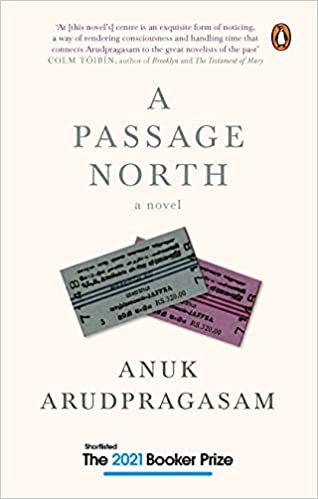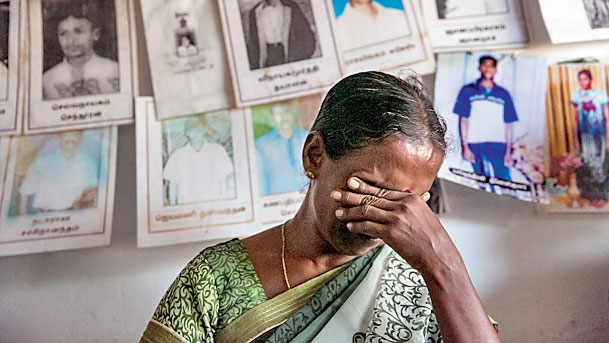Book: A Passage North: A Novel
Author: Anuk Arudpragasam
Publisher: Hamish Hamilton
Price: Rs 599
The way in which we experience time while travelling by train probably explains why the railways have shared a long and close relationship with the novel as a form and with the human propensity to retreat into memories. In his second novel, A Passage North, Anuk Arudpragasam explores this triad, tying it in with the personal and the political experiences of its protagonist, Krishan, as he travels from his home in Colombo to Kilinochchi situated in the Northern Province of Sri Lanka to attend the funeral of Rani, his grandmother’s caregiver.
The phone call from Rani’s daughter informing him of her violent death and an email from his former partner, Anjum, set off an intertwined journey across land and mind — scapes, as Krishan grapples with a sense of helplessness in the face of State violence and with unresolved feelings about his relationship. Rani had lost both her sons to the civil war — the older one in 2007, while fighting for the Tamil Tigers, and her younger on the penultimate day of the war to shrapnel from an aerial bomb.
Apart from listening to stories of individuals like Rani, Krishan pieces together his understanding of the war through archival footage and newspaper clippings, aware all along of how the narrative is distorted by the State. His decision to leave his doctoral research and take up work with a humble NGO in Jaffna to help rebuild the lives of a war-ravaged people arises partly, therefore, from a sense of survivor’s guilt. The dissonance that the privileged among us have felt in recent years — between our awareness of violence being perpetrated within the limits of our imagined geographies and the seeming indifference of our everyday lives with their uninterrupted rhythms — hangs heavy on Krishan: Arudpragasam deserves praise for helping readers acknowledge this troubled consciousness. Even before Krishan had moved back to Sri Lanka, Anjum had taken up work in rural Jharkhand, hoping to improve the labour conditions of women in coal mines.
The chapters that take us closest to Krishan and Anjum’s relationship exhibit some of the most compelling passages of writing. Starting with their first tentative encounter at a conference on queer identities in India to Anjum’s own fluid sexuality and occasional unpredictability, it is recreated with a rare but realistic sense of precarious excitement. In a novel that plays freely with time and memory, one section stood out for me for its narrative audacity: while travelling to Kilinochchi, Krishan recalls another train journey to Mumbai he had undertaken with Anjum during his last year in Delhi. From there, a maze of associations leads back to their first encounter and a Delhi metro ride, which prompts a conversation on navigating the intrusiveness of the male gaze in Indian cities. Reading it, I almost felt nervous on Arudpragasam’s behalf, wondering how he would extricate us from this thrice-folded narrative.

A Passage North: A Novel by Anuk Arudpragasam, Hamish Hamilton, Rs 599 Amazon
In terms of technique, A Passage North plays a risky game that pays off for the most part. It is written as free, indirect discourse and, in close to its three hundred pages, there is no reported speech anywhere. (Predictably, in an interview for the Booker Prize, Arudpragasam has cited Virginia Woolf, Marcel Proust, and Robert Musil as some of his key influences.) This decision also arises from the author’s self-conscious cultural positioning: a desire to avoid in fiction “the absurdity of putting English words into Tamil mouths.”
While this means that the narrator’s voice must work overtime to keep things lively (at times, it does veer tediously into over-analysed reportage), it makes the novel’s success even more striking. Apart from creating a credible cast of characters, Arudpragasam also rises to the challenge of accommodating multiple perspectives on his protagonist through the lens of other individuals (like his Appamma, Rani, or Anjum), who are present only as part of Krishan’s narrative. His gendered insecurities and the limitations of his belief in his ability to effect change in the world emerge as ironic commentary in relation to these individuals.
The novel contains a few ekphrastic passages which, however relevant, are too self-indulgent — like his recollections of reading Periya Puranam or Meghaduta — but many throwaway references (also listed in his acknowledgements) are worth pursuing if one wishes to gain a more nuanced understanding of the war. The most hard-hitting was the one that Krishan is reminded of by the sight of a lake close to Rani’s village: Beate Arnestad and Morten Daae’s 2007 documentary, My Daughter the Terrorist (available on YouTube), on two twenty-four-year-olds, Dharsika and Puhal, who train with the suicide squad of the Black Tigers. Perhaps this is another way in which Arudpragasam reminds us constantly of the limitations of his protagonist’s experience of the war and encourages us to re-examine our own assumptions about our position in times of conflict.










